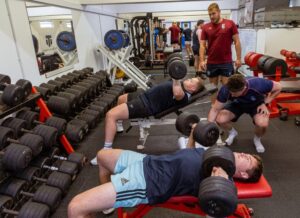Rugby Strength training can be as complex or as simple as you want to make it, in our experience. The basic principles are all you need to make significant strength gains. Without them you are setting yourself up to fail or to underachieve. We will cover the basic principles in this article.
It is always important to remember that developing strength is not just about the training you do. Other lifestyle factors play a significant role in how your body will adapt to the training you do. Sleep, Nutrition, Hydration, and the planning and periodisation of your training, all need to be well designed to help get you stronger in the gym and on the field!
Before we get started,
There are no shortcuts when it comes to training. If you don’t do the work, you will not get the results. What follows is how you can train smarter, not harder to maximise the effectiveness of your training and to ensure your results match the effort you put into it.
Now to get into the really important stuff. Strength Training! We have linked to a number of useful articles and videos throughout this article if you want to look a bit deeper into any of the ideas that are presented.


Strength Training 101
When we talk about strength training, we need to be very clear that “strength” can mean a lot of different things. The type of training you do should be dictated by the end results that you want to achieve. Needs analysis underpins all of the types of training we do at Rugby Renegade and strength is no different.
Some of the Science
A basic understanding of what happens when we do strength training for rugby can help rationalise why we train the way we do to increase strength.
When we lift heavy weights we put the muscular system and the nervous system in the body under stress. This stress causes the muscles to go through low levels of trauma and tearing, although, providing that the load is not excessively high the micro-trauma is not the same as an actual injury. The micro-trauma stimulates the body to repair and adapt to the stress. This is where strength gains come from.
The bones, muscles and tendons that move the weights grow and thicken to better tolerate the load in the future. And, the nervous system increases the amount of stimulation that it can provide to muscles. The combination of these adaptations allow us to create more force. A process called the supercompensation principle.
All of the structures in the body grow and adapt at different rates. One of the key reasons consistency and regular weight training is the only way to be successful!


How to Maximise Success
We’ve all been there; training hard but stuck in a rut and not getting the PB’s you’ve been dreaming of. Once you’ve focussed your training goals there are a few non-negotiables that dictate whether you are successful or not. Here are some of our top tips!
Safety
Train with a training partner: To stimulate strength gains and to trigger the micro-trauma we discussed earlier you need to overload the system and push the boundaries of what you can lift. To get strong, you need to lift heavy! Because of this we would stress the importance of training with a partner to help spot you if (or when) you lift to failure.
Warm-Up: A general warm up of mobility and activation is crucial for any time of training to reduce injury risk. For strength training you will also need to do a specific warm up consisting of targeted muscle activation of the groups of muscles that will be working during your training session. Once you’re lifting, be sensible with the loads you use. Start at a weight you know you can comfortably lift and then slowly build up over a number of sets getting closer and closer to your maximum for the programmed number of reps.
Train through range: Some athletes are range compromised due to previous injury or biomechanical issues but there should be an effort to train through range whenever possible. We can’t dictate the ranges where you will need to use your strength on the field so restricting it during training could leave you susceptible to injury on the field. Make yourself Rugby Proof by lifting through range wherever you can!
Consistency
You need to lift regularly! If you are looking for true strength gains you need to be lifting consistently and progressively 3-4 times per week. You can maintain strength and possibly make smaller improvements with less depending on your general condition but for strength training we don’t feel this is sufficient.
Specificity
We’ll deal with this first as it’s usually not an issue as most people who spend any time doing any form of resistance training will get stronger, so long as they are consistent.
But for maximal results and efficiency in your training, you need a program designed to increase strength. It may sound simple but a lot of the programs you may decide to try are not strength programs and can fall into general conditioning, hypertrophy or fitness sessions rather than strength!
As a quick check you need to be lifting the majority of the time over 75% 1RM, keeping reps below 6 reps per set and resting long enough to allow heavy weights to be lifted; 3-5mins.
Here’s a great article to help you get your strength programming on point: A Formula for Getting Stronger
Nutrition
Even if you’re not trying to build muscle (yeah right!) you still need a higher calorie intake to support strength gains. Recovering from any type of intense training requires calories especially in a sport like rugby where you have to balance different training demands.
So you need to carefully consider your diet. If you’re trying to lose weight you need to realise that it’s going to be extremely hard and might have to focus on strength first. You need to set aside 6-8 weeks where you’re happy to be eating more to get the strength gains coming.
Start with protein and consume 2g per kg of bodyweight. Increase your calorie intake too. There are tons of calculators out there but of course set them at above maintenance levels and make sure they take into account your training level. Next point is to not be afraid of carbs. Realising that carbs will fuel your sessions and help you recover, they are not the enemy!
For some great advice on nutrition for rugby listen to our podcast with Munster Nutritionist Emma Tester: Emma Tester Podcast
Or, check out our comprehensive nutrition article:
Nutrition for Rugby Players: The Ultimate Guide
Hydration is equally as important to ensure that you get the most from your training sessions. Our hydration guide is a great article to take a look at if you need more information on how to ensure you stay hydrated throughout your training week.
Prioritise
Nutrition is only one side of the calorie balance equation and one of the common mistakes we see players make is trying to get good at too many things at once and in the process missing the whole goal!
If strength is your priority you need to understand that you may need to reduce your other training sessions to the bare minimum. You only have a finite amount of energy reserves to recover from training so you need it channelled to your main goal.
Reduce any conditioning to rugby training only and low intensity where possible. Remember you need recovery of your nervous system to allow for good strength sessions and strength development.
Read about Hi/Lo periodisation to understand the nervous system and how to get the best from it with your training: Hi/Lo Periodisation
Progressively Overload
Does your training consist of the same workouts and just trying to add a little weight on the bar? Well although that is one way to progress it isn’t the only way and you need to find some way to progress without burning out and unfortunately very few people can continually add weight to the bar without hitting a block in the road.
Sensible progressions are also essential to minimising injury risk.
Make sure your training has goals and uses a variety of different progression methods, periodise what you try to improve. Try something like this:
- 4 weeks trying to increase the total number of reps you can perform for an exercise at a set weight.
- 4 weeks trying to increase the load at a certain rep range but without going to failure
- 2 weeks peaking to set a new rep record
There are tons of ways to organise your training but you must have some sort of plan that fits in with your goals.
Learn more about progression methods: Progression Methods
Recovery
We’ve covered off on nutrition and reducing other training stressors but what are you doing to enhance recovery? First port of call with recovery is sleep so make sure you’re getting at least 8 hours per night to allow full recovery and adaptation to training as well as reducing risk of injuries or cold/flu which will scupper any good training plan!
So onto actual recovery modalities. The best form in this case are low energy techniques because as you’ve already learnt excessively active methods will dig into those energy reserves we want focused on strength gains.
Good choices are pool recovery, massage, stretching and mobility, sauna, contrast showers/bathing, epsom salt baths, compression garments etc. Don’t take it lightly you need to recover as well as you train, and strength training for rugby is extremely demanding on all of the systems of the body.
Conclusion
Strength training for rugby should play a part in every rugby player’s schedule. Hopefully you found this article useful and be sure to check out the linked articles to get more information on other strength related topics!
If you want to take the work out of the planning of your training, make sure you check out the Rugby Renegade Membership or the Rugby Renegade Stronger for Rugby program.




